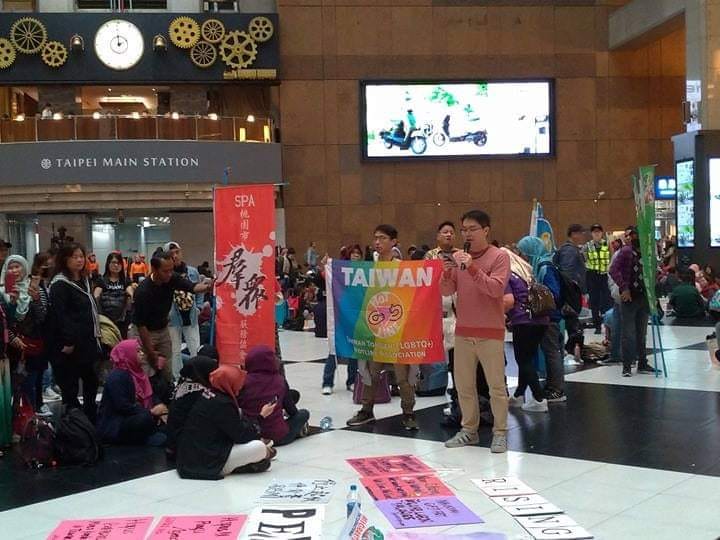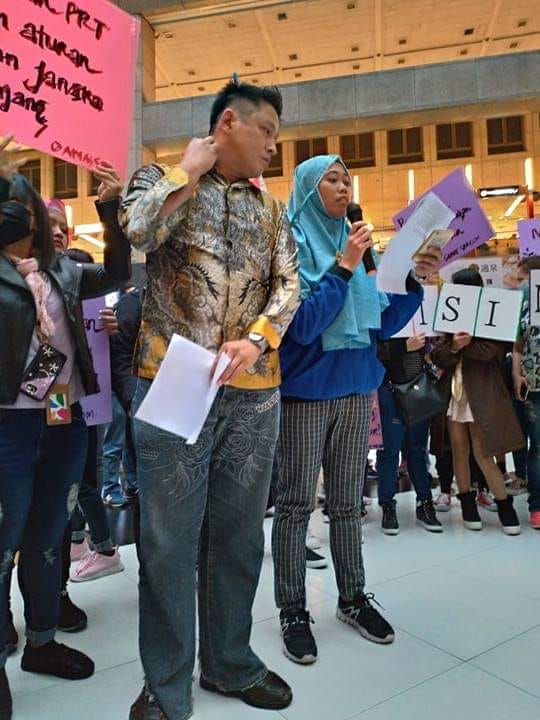by Brian Hioe
語言:
English
Photo Credit: OBR Taiwan/Facebook
SOUTHEAST ASIAN migrant workers, primarily women from the Philippines and Indonesia, rallied against sexual harassment, sexual assault, and racism in Taipei Main Station last weekend. The rally was held as part of the One Billion Rising global movement against sexual harassment and sexual assault, which has seen a revival in the Philippines in recent years. Many of the participating workers requested the day off ahead of time to participate in the demonstration, even though that might have been their only day off that month.
Organizing in the Philippines around One Billion Rising in recent years has partly been a response to growing public anger against frequently misogynistic comments by Filipino president Rodrigo Duterte, who has joked about rape on numerous occasions, even claiming that he once sexually assaulted a domestic worker and joking to soldiers that they could rape women with impunity. These comments provoked strong reactions from women’s groups in the Philippines at the time.
 Photo credit: OBR Taiwan/Facebook
Photo credit: OBR Taiwan/Facebook
However, in a Taiwanese context, female migrant workers organized to call attention to cases of sexual harassment and assault against them, usually from their Taiwanese employers. In many cases, migrant workers find themselves without any resources to take action against their employers, with police and even migrant worker hotlines downplaying or refusing to take action regarding incidents of sexual harassment or assault. While problems of workplace sexual harassment are already severe for Taiwanese women, such problems are even worse for female migrant workers in Taiwan who may not know where to seek help, face a language barrier, or may be reluctant to leave their jobs because of precarious work situations.
Taipei Main Station, a place that migrant workers frequently pass through and may congregate in on holidays or religious occasions, has become the site for many protests by migrant worker groups in past years. This includes demonstrations female migrant workers’ associations present in Taiwan, such as TransAsia Sisters Association, Taiwan, which deliberately aspires to represent female migrant workers of a number of nationalities, and the Filipina organization Gabriela, a leftist feminist organization which also has a presence in Taiwan.
Demonstrations in Taipei Main Station take the form of not only talks and demonstrations, but also creative protest actions intended to draw media attention, such as flash mobs, dances, or musical performances. However, apart from some investigative media outlets and some smaller media outlets specifically focused on migrant workers, Taiwanese media has generally failed to be attentive to the plight of migrant workers in Taiwan.
Likewise, discriminatory cultural attitudes prevail, as observed in comments by Kaohsiung mayor Han Kuo-yu referring to Filipina women as “Marias”, in suggesting that workers from the Philippines would be unfit to teach English in Taiwan because Taiwanese would not accept “Marias” teaching English. “Maria” is a derogatory term in Taiwan used to refer to Filipina female migrant workers.
 Photo credit: OBR Taiwan/Facebook
Photo credit: OBR Taiwan/Facebook
Han’s comments, which were also criticized during the rally, led to much public backlash at the time. This led Han to later try and claim that his comments were merely a “metaphor”, rather than reflective of his own views, though it should be noted that Han has made a number of sexist comments not unlike those by Duterte in the past.
Nevertheless, it should be clear that these sentiments are, unfortunately, all too common in Taiwan, with lacking discussion of the difficult conditions facing female migrant workers and migrant workers as a whole in Taiwan. Indeed, apart from scandals involving abuse of migrant workers in domestic settings, deaths of migrant workers in factories as a result of unsafe working conditions, or migrant workers forced to work on the high seas in slave-like conditions, several recent scandals actually involved southeast Asia students forced to work in factories by their colleges.
Cases of sexual assault, however, occur most frequently in domestic settings. Domestic settings are where the majority of Taiwan’s over 200,000 female migrant workers are employed, usually to take care of the elderly. As such, the endemic problem of sexual assault facing female migrant workers takes place in everyday domestic environments.
This may only contribute to why it proves so difficult to address such issues, seeing as Taiwanese society scarcely wishes to confront itself in a mirror darkly. And while Taiwanese politicians may pay lip service to the idea of female migrant workers becoming part of society, as observed in no less than Taiwanese president Tsai Ing-wen spotlighting female migrants during her presidential inauguration in 2016, few actions are taken to genuinely improve the condition facing female migrant workers on a material basis.

